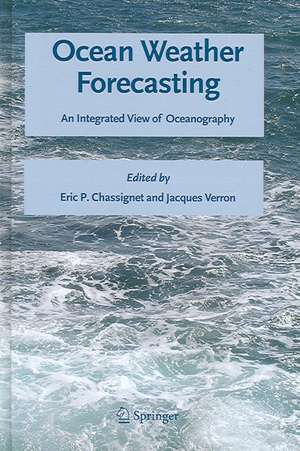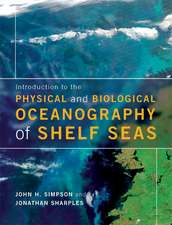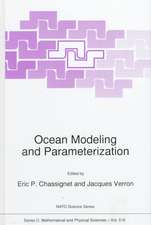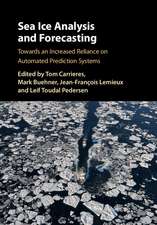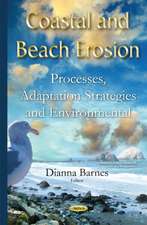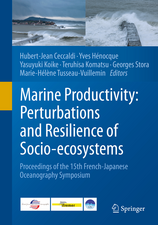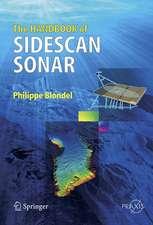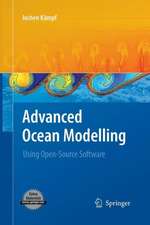Ocean Weather Forecasting: An Integrated View of Oceanography
Editat de Eric P. Chassignet, Jacques Verronen Limba Engleză Hardback – 2 feb 2006
| Toate formatele și edițiile | Preț | Express |
|---|---|---|
| Paperback (1) | 1063.36 lei 38-44 zile | |
| SPRINGER NETHERLANDS – 10 noi 2010 | 1063.36 lei 38-44 zile | |
| Hardback (1) | 1247.26 lei 43-57 zile | |
| SPRINGER NETHERLANDS – 2 feb 2006 | 1247.26 lei 43-57 zile |
Preț: 1247.26 lei
Preț vechi: 1521.05 lei
-18% Nou
Puncte Express: 1871
Preț estimativ în valută:
238.74€ • 259.41$ • 200.67£
238.74€ • 259.41$ • 200.67£
Carte tipărită la comandă
Livrare economică 21 aprilie-05 mai
Preluare comenzi: 021 569.72.76
Specificații
ISBN-13: 9781402039812
ISBN-10: 1402039816
Pagini: 592
Ilustrații: XII, 577 p.
Dimensiuni: 155 x 235 x 42 mm
Greutate: 1.29 kg
Ediția:2006
Editura: SPRINGER NETHERLANDS
Colecția Springer
Locul publicării:Dordrecht, Netherlands
ISBN-10: 1402039816
Pagini: 592
Ilustrații: XII, 577 p.
Dimensiuni: 155 x 235 x 42 mm
Greutate: 1.29 kg
Ediția:2006
Editura: SPRINGER NETHERLANDS
Colecția Springer
Locul publicării:Dordrecht, Netherlands
Public țintă
Professional/practitionerCuprins
Perspectives from the Global Ocean Data Assimilation Experiment.- Modeling.- Some Ocean Model Fundamentals.- Models of the Ocean: Which Ocean?.- On the Use of Hybrid Vertical Coordinates in Ocean Circulation Modeling.- Nesting Ocean Models.- Oceanographic observations and atmospheric forcing.- Satellite Measurements for Operational Ocean Models.- In-Situ Observations: Platforms and Techniques.- In-Situ Observations: Operational Systems and Data Management.- Surface Fluxes for Practitioners of Global Ocean Data Assimilation.- Data assimilation.- Ocean Data Assimilation Using Sequential Methods Based on the Kalman Filter.- What Is Data Assimilation Really Solving, and How Is the Calculation Actually Done?.- Importance of Data: A Meteorological Perspective.- The ECMWF Perspective.- Systems.- Mercator Ocean Global to Regional Ocean Monitoring and Forecasting.- The Forecasting Ocean Assimilation Model (Foam) System.- Ocean Prediction with the Hybrid Coordinate Ocean Model (HYCOM).- Bluelink: Large-To-Coastal Scale Operational Oceanography in the Southern Hemisphere.- Operational Oceanography: A European Perspective.- Mersea: Development of a European Ocean Monitoring and Forecasting System.- Internal Metrics Definition for Operational Forecast Systems Inter-Comparison: Example in the North Atlantic and Mediterranean Sea.- Operational Oceanography in the U.S. Navy: A GODAE Perspective.- Applications of Ocean Forecast Information for Economic Advancement in Developed and Developing Societies.- Forecasting the Drift of Objects and Substances in the Ocean.- On the Use of Data Assimilation in Biogeochemical Modelling.- Ocean Forecast and Analysis Models for Coastal Observatories.
Textul de pe ultima copertă
Ocean Weather Forecasting: An Integrated View of Oceanography
The field of physical oceanography has matured to a point where it is now conceivable to combine numerical models and observations via data assimilation in order to provide ocean prediction products on various spatial and time scales. As a result, many nations have begun large-scale efforts to provide routine products to the oceanographic community and started to develop operational oceanography systems. The Global Ocean Data Assimilation Experiment (GODAE) provides a framework for these efforts, i.e., a global system of observations, communications, modeling, and assimilation that will deliver regular, comprehensive information on the state of the oceans, in a way that will promote and engender wide utility and availability of this resource for maximum benefit to the community. The societal benefit of this experiment will be an increased knowledge of the marine environment and ocean climate, predictive skills for societal, industrial, and commercial benefit and tactical and strategic advantage, as well as the provision of a comprehensive and integrated approach to the oceans. We therefore considered it timely, given the international context, to bring together leading scientists, system developers, and application providers to present an integrated view of oceanography. The chapters collected in this volume cover a wide range of topics and summarize our present knowledge in ocean modeling, ocean observing systems, and data assimilation.
The field of physical oceanography has matured to a point where it is now conceivable to combine numerical models and observations via data assimilation in order to provide ocean prediction products on various spatial and time scales. As a result, many nations have begun large-scale efforts to provide routine products to the oceanographic community and started to develop operational oceanography systems. The Global Ocean Data Assimilation Experiment (GODAE) provides a framework for these efforts, i.e., a global system of observations, communications, modeling, and assimilation that will deliver regular, comprehensive information on the state of the oceans, in a way that will promote and engender wide utility and availability of this resource for maximum benefit to the community. The societal benefit of this experiment will be an increased knowledge of the marine environment and ocean climate, predictive skills for societal, industrial, and commercial benefit and tactical and strategic advantage, as well as the provision of a comprehensive and integrated approach to the oceans. We therefore considered it timely, given the international context, to bring together leading scientists, system developers, and application providers to present an integrated view of oceanography. The chapters collected in this volume cover a wide range of topics and summarize our present knowledge in ocean modeling, ocean observing systems, and data assimilation.
Caracteristici
Contributions by truly leading people in the field Interdisciplinary content and approach
